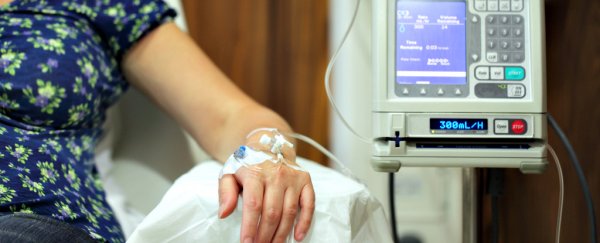Two patients in the US died last week in a leukaemia drug trial, despite being under close medical supervision.
The trial has been put on hold following the news, which is devastating for the families involved, but also a blow for scientists working on T-cell therapy - heralded as one of the most promising new treatments in cancer research.
The drug, which is called JCAR015, works by taking a patient's own T-cells - a type of white blood cell - and reprogramming them to hunt down leukaemia cells.
They then populate in the bloodstream, and destroy cells before they become tumours. Similar therapies have shown "unprecedented success", with a trial earlier this year seeing 94 percent of patients with advanced leukaemia go into remission.
But the side effects can be intense, because scientists have to first wipe out existing T-cells using chemotherapy before the treatment.
The trial, which is being run by a start-up called Juno therapeutics, has now had three patients die in total, including the two last week and one back in May. There were 20 patients enrolled in the trial.
"This is a humbling experience," Juno's CEO, Hans Bishop, told Matthew Herper from Forbes. "No doubt it is difficult for the physicians who are looking after these patients and their families. Clearly these therapies are potent, that's why they offer the potential for cures. We're still learning to use them in the safest, most efficacious way."
The three patients who have died were all in their 20s, and were suffering from relapsed B-cell lymphoma. Their deaths were all linked to cerebral oedema, or swelling of the brain.
While the company is still investigating these deaths, the culprit seems to be a chemotherapy drug called fludarabine.
In T-cell therapy, chemotherapy is given before the genetically engineered white blood cells are injected back into the patient, so that the new, cancer-killing T-cells can then repopulate the blood stream.
At the start of the JCAR015 trial, doctors were only giving patients a chemotherapy drug called cytoxan during that step, and with positive results. As Herper reports, early studies conducted at the Memorial Sloan-Kettering Cancer Centre in New York showed a response rate of around 80 percent.
But Juno is also running eight other T-cell trials at the moment, and in those it found that results seemed to be even better when they added fludarabine - so they decided to start giving the JCAR015 patients flubarabine in addition to cytoxan partway through the trial.
When the first patient died back in May after being given the combination of the drugs, the researchers running the trial didn't think it was related to the treatment - a conclusion backed up by the data safety monitoring board, and external regulators.
But when two more deaths occurred as a result of cerebral oedema last week, the trial was put on hold by the Food and Drug Administration (FDA), until Juno can prove that it's safe to continue.
The company is now proposing to the FDA that they restart the trial only using cytoxan again, and Herper reports that they should have a decision within the next month.
